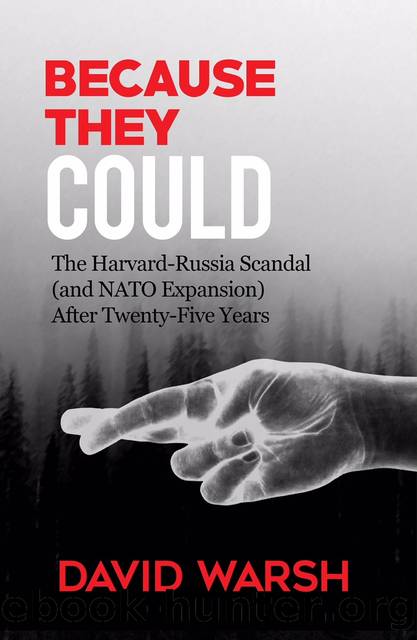Because They Could: The Harvard-Russia Scandal (and NATO expansion) after Twenty-Five Years by David Warsh

Author:David Warsh [Warsh, David]
Language: eng
Format: epub
Published: 2018-06-19T00:00:00+00:00
CHAPTER THIRTY-TWO
The Generation of â91
I met an old friend in the library one afternoon, a sharp old hand who had done time in Moscow many years before. It was the autumn of 2016; I had an armful of books. âWhat are you reading?â she asked. âRussia,â I replied, with some enthusiasm. âOh, Russia! Who cares?â Relations between the two countries are the worst since in 1963. How did we get so far off the track? The US press must bear a certain portion of the blame.
1.
The Soviet Union had been a forbidding place for journalists during the Cold War, because it was so expensive of money and grit to maintain a bureau there â a plum assignment for up-and-comers, a haven for those passionate or curious enough to abide year after year. Like many others of my generation, I first learned about the country from The Russians, by Robert Kaiser of The Washington Post, and Russia: The People and the Power, by Hedrick Smith of The New York Times, both books published in the Watergate year of 1976. By the end of the decade, a somber mood had set in. Russia: Broken Idols, Solemn Dreams (Times Books, 1983), by David Shipler, a Times correspondent in Moscow from 1975 to 1979, reflected the developing Soviet sclerosis. The book was regularly confiscated from travelers entering the USSR.
After Gorbachev became party secretary in 1985, Moscow slowly came alive. A talented press corps assembled to cover the demise of the Soviet Union. By the early â90s, Moscow became an open city, a magnet for talented young journalists of all sorts. Representatives of the big papers still ruled the roost. A series of successful books shaped public perceptions: Leninâs Tomb: The Last Days of the Soviet Empire, by David Remnick of The Washington Post, won a Pulitzer Prize in 1993. Down with Big Brother: The Fall of the Soviet Empire, by Michael Dobbs, appeared in 1997, after its author served successive terms in Yugoslavia, Poland and Russia for the Post. Serge Schmemann, of The New York Times, a highly influential Moscow reporter in those years, published his prescient Echoes of a Native Land: Two Centuries of a Russian Village (Knopf), also in 1997.
By then, a second generation had arrived to tell the story of the transition, of âshock therapyâ and privatization. You can get a vivid feeling for the times from David Hoffman, of the Post, who published The Oligarchs: Wealth and Power in the New Russia in 2002; or from Sale of the Century: Russiaâs Wild Ride from Communism to Capitalism (2000), by Chrystia Freeland, then of the Financial Times (today she is Canadaâs foreign minister). A third excellent book â Rebirth of a Nation, An Anatomy of Russia, by John Lloyd, of the Financial Times â didnât get nearly the attention it deserved when it appeared, only in Great Britain, in 1998, a harbinger of the disappointment that would set in.
By the time the husband-and-wife team of Peter Baker and Susan Glaser arrived for the Post, in late 2000, the narrative of disappointment was taking hold.
Download
This site does not store any files on its server. We only index and link to content provided by other sites. Please contact the content providers to delete copyright contents if any and email us, we'll remove relevant links or contents immediately.
International Integration of the Brazilian Economy by Elias C. Grivoyannis(111059)
The Radium Girls by Kate Moore(12028)
Turbulence by E. J. Noyes(8049)
Nudge - Improving Decisions about Health, Wealth, and Happiness by Thaler Sunstein(7707)
The Black Swan by Nassim Nicholas Taleb(7129)
Rich Dad Poor Dad by Robert T. Kiyosaki(6632)
Pioneering Portfolio Management by David F. Swensen(6300)
Man-made Catastrophes and Risk Information Concealment by Dmitry Chernov & Didier Sornette(6019)
Zero to One by Peter Thiel(5802)
Secrecy World by Jake Bernstein(4753)
Millionaire: The Philanderer, Gambler, and Duelist Who Invented Modern Finance by Janet Gleeson(4478)
The Age of Surveillance Capitalism by Shoshana Zuboff(4292)
Skin in the Game by Nassim Nicholas Taleb(4248)
The Money Culture by Michael Lewis(4207)
Bullshit Jobs by David Graeber(4190)
Skin in the Game: Hidden Asymmetries in Daily Life by Nassim Nicholas Taleb(4007)
The Dhandho Investor by Mohnish Pabrai(3765)
The Wisdom of Finance by Mihir Desai(3747)
Blockchain Basics by Daniel Drescher(3583)
